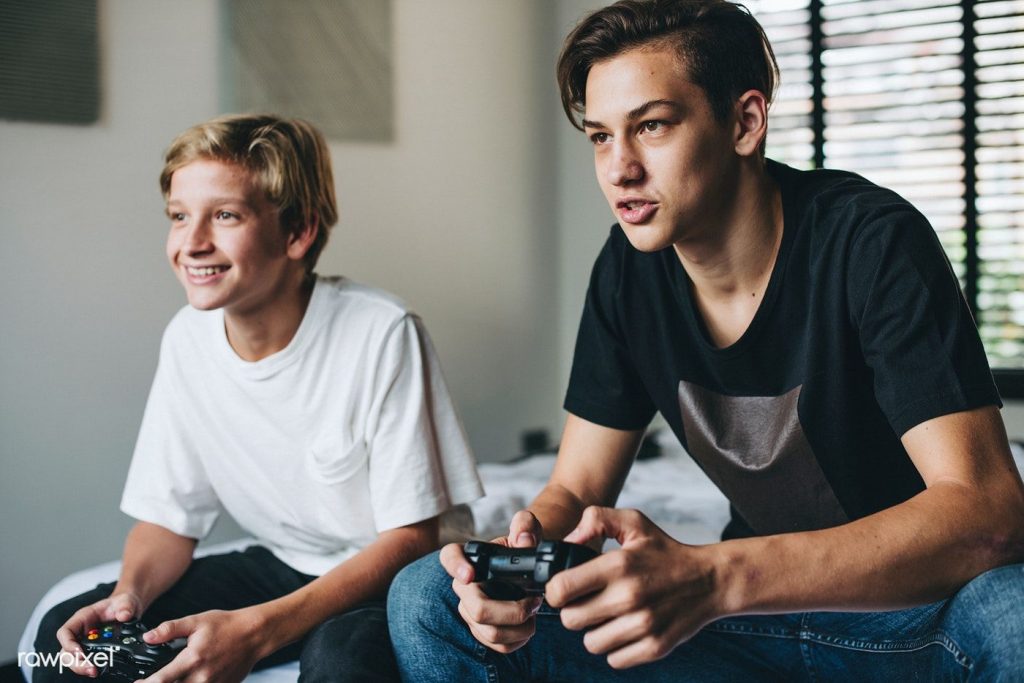Is your teenager video gaming & playing online non-stop since being in isolation? Do you wish they would go outside, ride their bike, play a game or use their imagination?
Are they unable to explore their usual activities & interests due to COVID-19 restrictions?
Isolation due to COVID-19 equals lots of spare time! Lots of time for teens to be video gaming and play online with friends. Have a think, how much are they really playing, now that they’re home so much?
You’re probably hearing from your teen, “There’s nothing else for me to do other than play video games”, or “I’m playing games with my friends; it’s the only way for us to hang out now.” As a parent, you can probably feel that it is a bit too much, even though you know they’re happy playing and interacting with their friends. But, if you’re finding that’s ALL they’re doing, and they’re not doing their chores, home schoolwork or having conversations with family, it’s normal to feel concerned. Don’t worry, we feel your pain!

You might be thinking, what can I do?
There are ways you can guide your teen to balance their time video gaming or on technology with their responsibilities and alternative activities.
1. Validation
Sit down with your teen and validate the benefits they gain from playing online games or social media. COVID-19 is a difficult time for many, so explain that you are happy for them that they have a way to stay in touch with their friends. It’s important for your teen to realise that you wholeheartedly understand the benefits and that you want them to continue playing to have fun and communicate with their friends.
2. Have a Conversation about Balance
Calmly speak with your teen about using this time at home to think about developing a new hobby or interest, that they can do individually, with siblings, or with their friends. For example, pairing up with a ‘school buddy’ to check-in with one another’s progress with homework & schoolwork, and make sure they’re on track. It’s also helpful for teens to feel they can vent to their friends or receive support from one another around these activities.
Some ideas you can talk over with your teen:
- Friends can challenge each other to share something new they discovered each day with their friends. E.g. a new song, book, app, TV show or game they discovered.
- Friends who may be interested in sports could watch certain games on YouTube, then discuss it.
- Friends who play instruments can try playing together via Facetime or discuss new music they could potentially play together.
- Friends can set up daily challenges for one another, for example in the area of drawing, writing, film, boardgames, cards, puzzles, Lego, photography, or learning a musical instrument or a few words from a new language.
3. Encouragement
Encourage and praise your teen for any attempts they make to try something different or new. It’s important to remember, no idea is a bad idea, but some might be more plausible than others. At home, we encourage you to keep a routine, create opportunities for quality time as a family, incorporate fun or friendly competition into daily chores to add variety into the family routine. Make sure to write down any promising ideas on a piece of paper that can be kept in view of your teen as a reminder. You can even put this on the fridge! Then if your teen feels bored, challenge them to choose an activity from their list rather than resorting to gaming first.
Afterwards, ask them about their new activity and how it went for them.
Parenting teens is tough at the best of times, and now with isolation, the challenges are ten-fold. Don’t be afraid to get creative, and brainstorm ideas as a family too.
If you feel you or you or your teen would benefit from some support during this difficult time, reaching out for professional support is a step in the right direction. Our expert online gaming & technology Clinical Psychologist Dr Bianca Heng, is available to meet with you, face-to-face, over the phone or through video conferencing. She is a gamer herself, so can relate well to the video gaming world.
Written by Dr Bianca Heng – Clinical Psychologist – www.creatingchange.net.au

